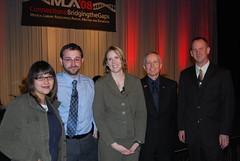Medical Librarians Get Healthy Dose of Social Networking

Web 2.0 speakers at the Medical Library Association conference in Chicago, from left: Amanda Etches-Johnson, David Rothman, Melissa Rethlefsen, MLA President Mark Funk, and Bart Ragon. |
“MLA 2.0,” said Medical Library Association President Mark Funk, “will be about communication, community, openness, participation, and connecting.” Kicking off MLA’s May 16–21 annual meeting and exhibition in Chicago, the head of resource management and collections at the Weill Cornell Medical Library in New York City told 2,484 enthusiastic attendees that new technology decreases isolation if we learn to use it right.
“It isn’t about the tools; we must beware the lure of the shiny,” Funk observed, focusing on the change, innovation, and social networking opportunities the tools enable. Repeating several times that “we have always done it that way” is the worst possible justification for doing anything, he said “social media are all about participation” but admitted that there needs to be more room in associations for passion, ingenuity, and self direction.
According to Funk, bureaucracies are changing, becoming less hierarchical and opening up through blogs, wikis, RSS feeds, and podcasts. Delivering the annual McGovern Lecture, futurist Andrew Zolli explained that “innovation is the creation of new forms of value in anticipation of future demand” and bolstered Funk’s view that organizations have the insights and the tools available to them for shaping their future. Effective communication is the most important element, he said.
Breakout sessions throughout the conference reflected the emphasis on social networking. Among the programs were “Unbound Medicine: uCentral Connects Patrons to Library Content via iPhone, Blackberries, Smartphones, and PDAs” and “Second Life for Engagement, Outreach, and Building Interdisciplinary Communities of Learning.” Also on the agenda were a number of “Connections: Bridging the Gaps” (the conference theme) programs, including “Bridging the Communication Gap Between Patients and Physicians/Practitioners.” A “Technology Showcase” and a series of “Sunrise Seminars” enabled EBSCO, Basch Subscriptions, the BMJ Group, TDNet, Thomson Scientific, and other top vendors to demonstrate their newest products and services. The conference also included an update from the National Library of Medicine and a number of section seminars devoted to specific areas of medical specialization.
MLA Executive Director Carla Funk (no relation to MLA President Mark Funk) and incoming President Mary L. Ryan outlined the association’s agenda for the coming year. Ryan said the top priorities for her presidency will be recruitment and retention of library professionals, advocacy for the profession and its issues, and the efficiency and effectiveness of association operations. Carla Funk said that a recent survey revealed that advocacy is now the top reason members cite for joining MLA.
The conference also featured the association’s first live webcast of a plenary session, “Web 2.0 Tools for Librarians: Description, Demonstration, Discussion, and Debate.” David Rothman, information services specialist for the Community General Hospital Medical Library in Syracuse, New York, observed, “The Web isn’t just for geeks anymore,” as he urged librarians to “be web creators, not just consumers.”
Other members of the Web 2.0 panel were Amanda Etches-Johnson of McMaster University in Hamilton, Ontario, Bart Ragon of the University of Virginia in Charlottesville, and Melissa Rethlefsen of the Mayo Clinic College of Medicine in Rochester, Minnesota, who talked about how librarians are using social networking applications to create online communities. “This is our future,” Ragon said. “We’re not going to be programmers, but we are going to be talking to the programmers.”
Delivering the annual Janet Doe Lecture, Thomas G. Basler gave the conference theme a different spin. Director of libraries and learning resource centers and chair of the Department of Library Science and Informatics at the Medical University of South Carolina in Charleston, Basler observed that the golden age of medical librarianship is over, and gone with it are its “giants,” the profession’s pioneers. Today, “it’s not about being a librarian,” he said, “it’s about being a part of your institutional team.”
“Now more than ever,” Basler concluded, “if your operation is not essential to the daily life of the larger organization, it’s not long for this life.” Speaking to the longtime professionals in the crowd, he urged them to go back to their workplaces and “do one innovative thing” and then “quit doing one thing you’ve always done.”
Posted on May 24, 2008. Discuss.
